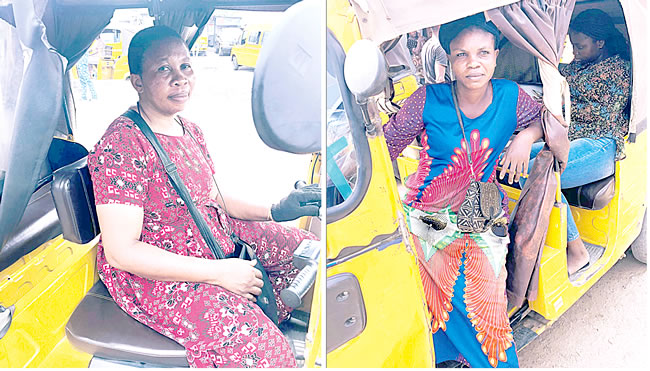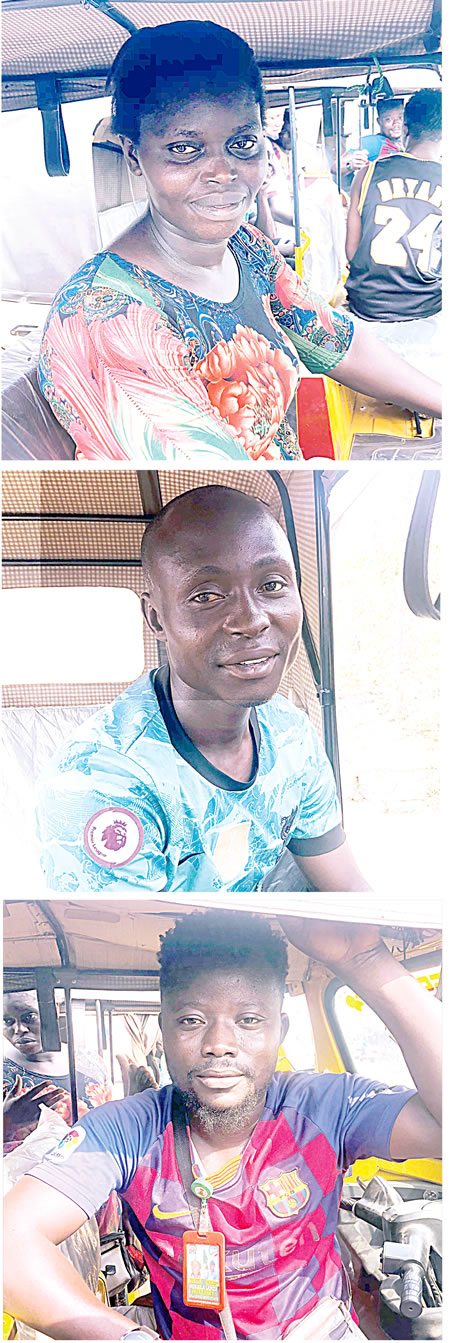The population of women transport workers is on the rise as commercial driving is now a viable option in the face of high-level unemployment and economic struggles in the country. KOLA MUHAMMED reports the experiences of these women transport operators, especially the tricycle riders popularly known as Marwa.
For commercial riders, there is nothing unusual in one vehicle having a brush with another, as long as it is not a serious issue. However, when Bolanle’s (not real name) tricycle had a slight contact with that of Elias, a co-transport operator, the response from the latter was far from being a simple expression of anger.
Getting down from his tricycle and realising that the driver of the other tricycle was a woman, Elias reacted, “you’d better return to selling provisions on the street and not poke nose into a vocation that is not meant for you.”
Although the reaction provoked laughter from onlookers around, the sarcasm was not lost on them; that transport business was an exclusive terrain for men.
However, such assumption is becoming unfounded on a daily basis as there appears to be a growing number of women venturing into road transport business. Investigations, however, show that the women involved decided to go into the business for different reasons.
For some of them, it was due to the harsh economic situation, unemployment and the need to survive. According to Sunday Tribune investigation, some of the women transport operators are widows, single mothers and breadwinners of their families.
Many of the women could not afford the tricycles on their own without going for hire purchase and had to pay back with stringent conditions. As they get to work, they struggle with all sorts of levies on a daily basis.
Blossom Okun is a woman tricycle rider. Shouting at the top of her sonorous voice, she, like many other women tricycle riders in Lagos and Ogun states, could be seen everywhere on the road doing their business alongside their male counterparts.
Although Okun does not possess the regular deep voice of a man, her vigour, nonetheless, appears admirable from afar, on the Fagba-Iju axis where she plies her trade. Her good command of the English language also suggests that she must have passed through the four walls of a tertiary institution.
Speaking to Sunday Tribune, Okun, who hails from Ihitte/Uboma Local Government area of Imo State, but relocated to Lagos for better opportunities, lamented that a downturn in her family fortunes, alongside the non-payment of the gratuity and pension of her retiree husband forced her into riding a tricycle for survival.
“After completing my tertiary education, I worked as a teacher for 10 years before things changed and the job was no longer adequate in catering for the responsibilities of my family. At that time, my husband retired as a civil servant and we thought his gratuity and other entitlements would improve our fortunes. Unfortunately, till date he is yet to receive anything. With two kids to take care of, it was left to me to step up and ensure the whole family does not starve.
“I had to quit my teaching job as the income got us nowhere. In the period of quitting and trying my hands on other things, my kids could not go to school for two full sessions. That period was the most depressing in our lives. We literally lived from hand to mouth. I leveraged on my driving skills to begin to ride a tricycle,” she said.
Her experience in the field, she says, is bittersweet. The mother of two, however, wishes that many things would change about the profession, especially the huge levy being paid daily and the attitude of collectors towards riders.
“On top of it, the levies – under the guise of pass, park ticket and so on – which I pay daily is about N3,000. Every park charges a fee. At the end of the day, what is left for me to take home is sometimes insignificant,” she said.
For Ajidat Sobiyi, her mind was made up to compete with men in the tricycle business, rather than go into prostitution due to the harsh economic climate.
“I went into commercial driving because things were so hard that the only thing left for me was either doing it or going into prostitution. I have mouths to feed and as a responsible woman, I can’t sit idle while my kids starve.
“I had to train for about two months before I went into the business fully. I have spent about eight months on this job and now I have a grocery store which I run by the side. While I am doing the transport business, I have an attendant who stays at the shop and is also assisted by my children,” she said.
Thankfully, my children are in secondary school. They are mature enough to take care of themselves in the basic things. They understand that I need to be able to provide for them and I ensure that I create time for them despite the demanding nature of this job,” Sobiyi added.
Unlike Sobiyi and Okun, the motivation for Iya Ibadan, a widow, who drives a mini-bus, popularly known as korope, in Osun State, wasn’t poverty. She has been a farmer and used to drive a pick-up van to transport farm produce from the farm to the market. She later went into full transport business shuttling between Osogbo and Ede.
“I am a farmer. Although it was not common for women to drive vehicles from the farm to the market and vice versa, I did. Afterwards, I felt that I could shift my attention from farming to driving.
“Sometimes, I would help other farmers and I felt that it would be nice to monetise it. That was how I started driving before I moved into the mainstream driving, shuttling cities, and states occasionally.
“Though my children often say that when they are well-established, they will take me away from it, I have grown to fall in love with the business. I will consider stopping when I feel my body cannot take it again,” Iya Ibadan further disclosed.
Most women in the transport business are not finding it easy in the male-dominated industry. Madam Okun’s experience is that of lamentation.
“I must confess that there is no tolerance for us women. I remember when I just started driving and didn’t know where to pick passengers and where not to; the tyres of my vehicle were occasionally deflated because of a mistake which I feel could be overlooked, given that I was new. Sometimes my key could be seized,” she lamented.
Tina Monday, who also plies her trade in Ibadan, Oyo State, says that there is no preference for gender when it comes to the way the business is done. She did not expect it to be an easy ride either.
“Passengers don’t pay you more because you are a woman, neither does a reduced park charge. Going into this business, I, like many other women, was prepared to slug it out. Hence, we did not expect any preferential treatment,” she explained.
Women in transport leadership rank
Given the growing number of women among the ranks of transport workers, there is a growing concern that there should be women representation in the leadership of the National Union of Road Transport Workers (NURTW) across parks and chapters.
Responding to such concerns, the chairman of Iyana Express chapter of the National Union of Road Transport Workers in Ibadan, Olaoluwa Samuel, says that women can’t cope with the physical demands of the offices.
“Inasmuch as it would give an impression of gender inequality when it comes to the constitution of leadership, the responsibilities of the offices are physically demanding. For instance, a woman can’t be the park manager and run after vehicles trying to collect levies.
“It’d be too much to ask. At the same time, a woman may not be able to cope with the demands of higher offices given the toll they take on the body. As for the offices they could manage, the complaint is that there is no incentive attached to them. Hence, there is little interest on their part,” Samuel added.
Association of women transporters
Given that the nature of the leadership of the male-dominated NURTW seems not to be women-inclusive, Sunday Tribune investigated what it would take to have a separate association for women transport workers.
Okun is of the opinion that in any locale, women are their own worst enemy as they do not speak with one voice, let alone having an association.
“For the areas I patrol in Lagos, very few of us get along with one another. A section of us female drivers see others as competitors as each person seeks to assert herself as the ‘boss lady’, which I find rather unnecessary.
“If we are still contending with issues like normal rapport among us, then coming together to ask for an association would be really difficult. An association for us will definitely help us and reduce the yoke of taxes on our necks but it is a long way to go,” Okun added.
For Madam Oluwole, being a transport leader, she knows that forming an association of women transporter could only emanate from the national headquarters of the body.
“Although I don’t think it is an idea that has started making the rounds, however, local and state chapters are powerless in this regard. They would have to take the motion to the very apex of our association where it is the only place ratification can come from.
“Meanwhile, as far as I know, we give equal treatment to everybody, irrespective of gender and ensure fairness at all times,” she said.
Appeal for government’s support
Across the states of Lagos, Ogun, Oyo and Osun, female transport workers told Sunday Tribune that they would need government’s support in securing owning their own Marwa tricycles given the cost of getting one.
“A tricycle costs close to one million naira if one would buy outright, and about N1.3 million for hire purchase. With the situation of things, these prices are not affordable for us. If we go for hire purchase, by the time we finish paying in about two years, the tricycle would have become old and we have to start all over again,” Tina Monday stated, echoing the opinion of several other women transport workers.
YOU SHOULD NOT MISS THESE HEADLINES FROM NIGERIAN TRIBUNE
As Nigeria Enters The New Year, More People Die Of COVID-19
Last week, Nigeria recorded 55 new COVID-19 deaths which is the highest in over four months, Tribune Online analysis reveals. According to data sourced from the Nigeria Centre for Disease Control (NCDC), the last time Nigeria recorded more deaths than last week was the 59 deaths reported in the 32nd week of the pandemic (August 2 – August 8)…
A close ally of President Donald Trump and the United States Attorney General, William Barr, has resigned his appointment after holding a meeting with the president…
COVID-19 Vaccine To Arrive Nigeria End Of January — PTF
NATIONAL coordinator of the Presidential Task Force (PTF) on COVID-19, Dr Sani Aliyu, has said the nation is expected to receive its first batch of the COVID-19 vaccines by the end of this month. Aliyu made the disclosure as a guest on ARISE News, on Sunday. Upon receipt of the vaccines, Aliyu said vaccination of the public, especially those that are vulnerable, the elderly…
Rays of the afternoon sun pelted her head as she fanned the embers beneath the half-cut iron drum with the smoke permeating the air. “This smoke is unbearable, Iya Maria,” said one of the three neighbours conversing under a makeshift shed about five meters away. Their voices rose and fell intermittently…
International Criminal Court Begins Probe Into Shooting Of #EndSARS Protesters In Nigeria
The International Criminal Court (ICC) has disclosed that it’s conducting a preliminary investigation into the recent #EndSARS protests in Nigeria, the British Broadcasting Corporation (BBC) reported on Wednesday…







